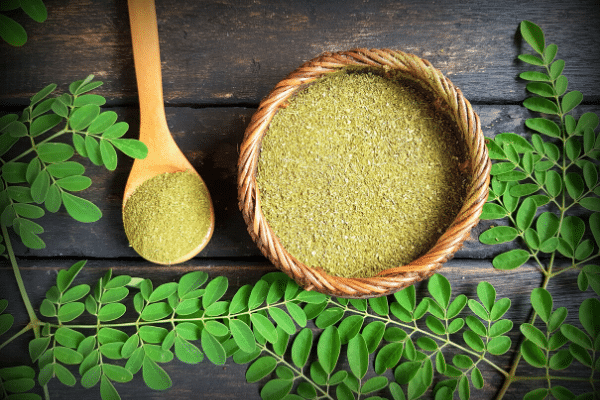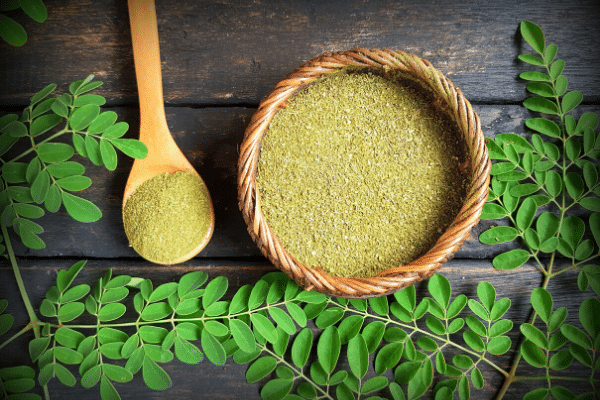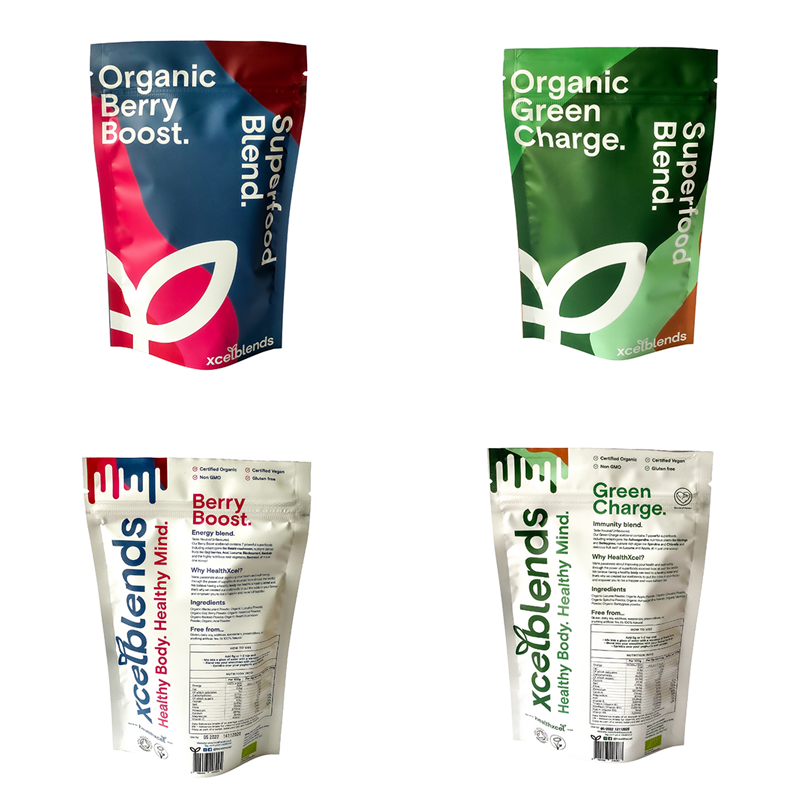“An important factor that accounts for the medicinal uses of Moringa oleifera is its
very wide range of vital antioxidants, antibiotics and nutrients including vitamins and minerals.”

Moringa (moringa oleifera) is known by over 100 names in different languages around the world. This easy-to-grow tropical plant species, native to the Himalayan mountains and parts of India and Africa, comes packed with over 90 protective compounds, including isothiocyanates, flavonoids and phenolic acids.
There are actually believed to be at least a dozen different varieties of the moringa tree, which belong to the plant family Moringaceae. These are fast-growing, tall, leafy plants that produce flowers or pods. Of all the species, one (moringa oleifera) is by far the most utilised. Prior to the plant’s effects being demonstrated in scientific studies, it was used extensively in traditional medicine practices like Ayurveda medicine for over 4,000 years.
Moringa has gained a reputation for fighting inflammation and combating various effects of malnutrition and ageing, earning the nickname “the miracle plant.”
Benefits of moringa include helping treat a wide variety of conditions, such as:
- inflammation-related diseases
- cancer
- diabetes
- anemia
- low energy and fatigue
- arthritis and other joint pain, such as rheumatism
- allergies and asthma
- constipation, stomach pains and and diarrhoea
- epilepsy
- stomach and intestinal ulcers or spasms
- chronic headaches
- heart problems, including high blood pressure
- kidney stones
- fluid retention
- thyroid disorders
- low sex drive
- bacterial, fungal, viral and parasitic infections

The National Institute of Nutrition’s 1989 book, “Nutritive Value of Indian Foods,” shows a handful of moringa leaves contains:
- Seven times the amount of vitamin C in an orange
- Three times the amount of iron in spinach
- Four times the amount of vitamin A in a carrot
- Four times the amount of calcium in one glass of milk
- Three times the potassium in one banana
- Two times the protein found in regular, plain yoghurt
Moringa is a unique plant because almost all parts of it — leaves, seeds, flowers/pods, stem and roots — can be used as a source for nutrition and other medicinal properties.
The most popular medicinal use of this plant involves drying and grinding down moringa leaves, where most of the antioxidants are found.
Studies have revealed that moringa powder is loaded with phytochemicals, protein, calcium, beta-carotene, vitamin C and potassium. Because it provides a concentrated source of vitamin A, it’s given to thousands of children in third-world countries every year suffering from life-threatening vitamin A deficiency.

Provides Antioxidants and Anti-Inflammatory Compounds
Moringa oleifera seems to have similar abilities as certain conventional drugs, only it doesn’t pose the same level of risk for experiencing side effects. According to a report published in the Asian Pacific Journal of Cancer Prevention, it contains a mix of essential amino acids (the building blocks of proteins), carotenoid phytonutrients (the same kinds found in plants like carrots and tomatoes), antioxidants, such as quercetin, and natural antibacterial compounds that work in the same way as many anti-inflammatory drugs.
Studies have shown that these compounds are protective of the heart, natural circulatory stimulants, and possess antitumor, anti-epileptic, anti-ulcer, antispasmodic, antihypertensive and antidiabetic effects.
Moringa powder is high in several powerful anti-ageing compounds that lower the effects of free radicals, oxidative stress and inflammation. These are associated with a reduced risk for chronic diseases, such as stomach, lung or colon cancer; diabetes; hypertension; and age-related eye disorders.
Balances Hormones and Slows the Effects of Ageing
A 2014 study published in the Journal of Food Science and Technology tested the effects of moringa (sometimes also called “drumstick”) along with amaranth leaves (Amaranthus tricolor) on levels of inflammation and oxidative stress in menopausal adult women. Researchers wanted to investigate if these superfoods could help slow the effects of ageing by balancing hormones naturally.
Levels of antioxidant status, including serum retinol, serum ascorbic acid, glutathione peroxidase, superoxide dismutase and malondialdehyde, were analyzed before and after supplementation, along with fasting blood glucose and haemoglobin levels.
Results showed that supplementing with moringa and amaranth caused significant increases in antioxidant status along with significant decreases in markers of oxidative stress. Better fasting blood glucose control and positive increases in haemoglobin were also found.
Can moringa help you sexually? There’s some evidence it may boost libido and work like a natural birth control compound, according to some animal studies. Although it’s historically been used as a natural aphrodisiac, it actually seems to help reduce rates of conception. That said, it can boost the immune system during pregnancy and also increase breast milk production/lactation, according to some studies.
Helps Improve Digestive Health
Due to its anti-inflammatory properties, moringa has been used in ancient systems of medicine, such as Ayurveda, to prevent or treat stomach ulcers, liver disease, kidney damage, fungal or yeast infections (such as candida), digestive complaints, and infections.
A common use of moringa oil is helping to boost liver function, therefore detoxifying the body of harmful substances, such as heavy metal toxins. It might also be capable of helping fight kidney stones, urinary tract infections, constipation, fluid retention/edema and diarrhea.
Balances Blood Sugar Levels, Helping Fight Diabetes
Moringa contains a type of acid called chlorogenic acid, which has been shown to help control blood sugar levels and allow cells to take up or release glucose (sugar) as needed. This gives it natural antidiabetic and hormone-balancing properties.
Aside from chloregnic acid, compounds called isothiocyanates that are present in moringa leaf have also been tied to natural protection against diabetes.
A study that appeared in the International Journal of Food Science Technology found that this plant had positive effects on blood sugar control and insulin levels in patients with diabetes when eaten as part of a high-carbohydrate meal. Separate studies have demonstrated that anti-diabetic activities of low doses of moringa seed powder (50–100 milligrams per kilogram body weight) help increase antioxidant status and enzyme production within the liver, pancreas and kidneys of rats and prevent damage compared to control groups.
High levels of immunoglobulin (IgA, IgG), fasting blood sugar and glycosylated hemoglobin (HbA1c) — three markers seen in diabetics — were also found to decrease as a result of moringa given to rats with diabetes. Can moringa help you lose weight? Because it can improve insulin sensitivity and hormone balance, it may offer some advantages to those following a weight loss plan.
Protects and Nourishes the Skin
Several popular uses of moringa oil are to help retain skin’s moisture, speed up wound healing, and soothe dry or burnt skin.
Moringa contains natural antibacterial, antifungal and antiviral compounds that protect the skin from various forms of infections. Some of the common ways it is used on the skin include reducing athlete’s foot, eliminating odours, reducing inflammation associated with acne breakouts, treating pockets of infection or abscesses, getting rid of dandruff, fighting gum disease (gingivitis), and helping heal bites, burns, viral warts and wounds.
The oil is applied directly to the skin as a drying, astringent agent used to kill bacteria, but at the same time, when used regularly it’s known to act like a lubricant and hydrate the skin by restoring its natural moisture barrier. It’s a common ingredient used in food manufacturing and perfumes because it prevents spoilage by killing bacteria — plus it has a pleasant smell and reduces odours.
Helps Stabilize Your Mood and Protects Brain Health
As a high-protein food and a rich source of the amino acid tryptophan, moringa supports neurotransmitter functions, including those that produce the “feel good” hormone serotonin.
It’s also rich in antioxidants and compounds that may improve thyroid health, which makes it beneficial for maintaining high energy levels plus fighting fatigue, depression, low libido, moods swings and insomnia.
